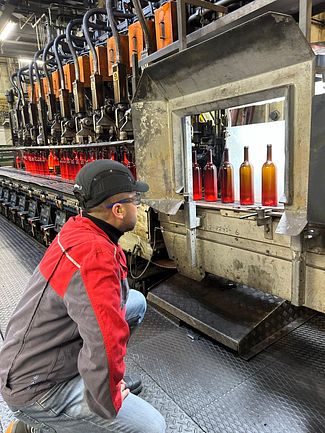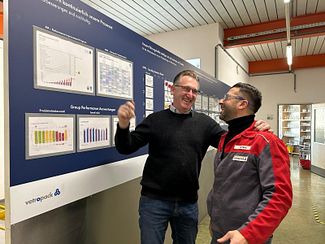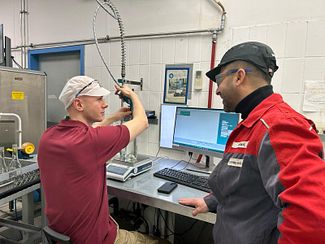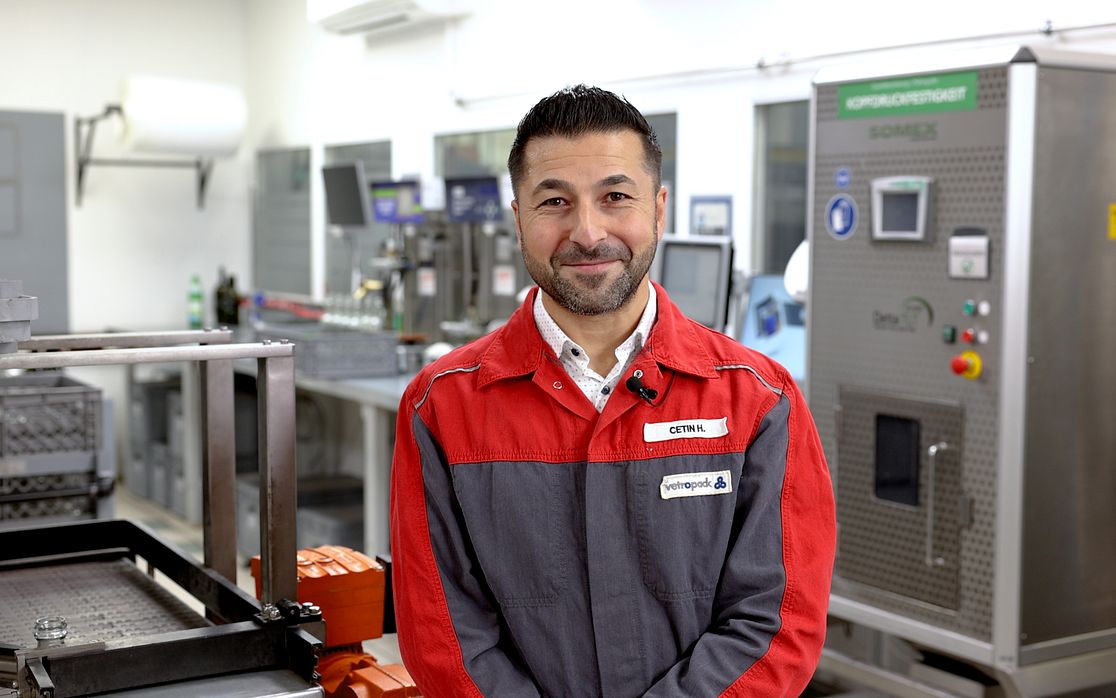Hasan Cetin
In his role as Group Quality Manager, Hasan Cetin has headed the Vetropack Group’s quality management since January 2025. His work focuses on norms, quality standards, certifications and audits – and he also provides support in case of complaints. Hasan’s multi-faceted mission embraces all our plants and every step in production.
«You can feel from the interactions that Vetropack is a family business. I value this diversity in my role. And it brings me joy to share my knowledge and provide support.»
To ensure that consumers can enjoy their food and beverages in flawless glass packaging, one centralised unit oversees all processes alongside the many glass production stations that are each responsible for one manufacturing step – and the name of that unit is Quality Management.
‘We want to deliver optimum quality,’ Hasan Cetin says. ‘And to achieve that, I collaborate closely with all the Business Units. I also want to step up our cooperation with the Technology team so as to ensure quality across all the stations – from inspection of raw materials through to the moment when consumers enjoy the product from the bottle.’
Hasan Cetin started as a Group Quality Manager in January 2025, after working as Group Quality Assurance Manager at Vetropack for the previous four years. In this new position, he took on responsibility for our company's entire quality management – including norms, certifications, audits, processing of complaints, harmonisation, and quality standards.

One key focus of his work is on the ISO standards to which Vetropack is certified as a producer of glass for foodstuffs. ‘We produce glass packaging for food. Critical defects can have serious consequences for consumers,’ Hasan emphasises. Good ratings – and our company's position as virtually the exclusive supplier of the blue Carlsberg bottle – show that quality pays off.
Vetropack is also making progress with harmonising standards across all our sites. ‘For example, we’ve done a good job of integrating Chișinău, we’ve obtained ISO 22000 certification, and we’ve already completed the second audit successfully.’

He travels a lot – so there’s almost no such thing as a typical working day for him. ‘When I'm in my office in Pöchlarn, I work on a variety of different issues – for example, how to adopt a standardised approach to critical defects. We’ve developed an action guideline for this,’ he explains. In case of critical complaints, Hasan is called in to clarify the cause and support the plants. ‘Spontaneous enquiries are also part of the job. As everyone knows: my door is always open, and people can call me at any time.’
His days on site at our plants follow a different pattern. Hasan makes two to three site visits each year, when he starts out with a tour of the outdoor facilities. Then he walks through the plant – from the hot end to the cold end, and through to quality assurance and the mould workshop. ‘I want to gain a 360-degree overview of the plants,’ he says. ‘That includes seeing and understanding everything on site.’ To get a grasp of the current situation on the ground – regarding aspects such as occupational safety, cleanliness or quality – he tries to be as close to his colleagues as possible. ‘This means being actively present on the shop floor close to the containers, and checking quality,’ he explains. ‘But first and foremost: it means talking with colleagues.’

His responsibilities also include boosting the plants’ performance. For this purpose, the IMS team introduced Root Cause Analysis (RCA) in 2023: this is a standardised procedure to investigate the causes of defects on a systematic basis. ‘I’ll be actively driving RCA ahead this year,’ Hasan Cetin notes. He plans to implement the RCA method in our plants, and to instruct and support the colleagues involved as this takes place.
Despite his meetings Hasan emphasises that his job isn’t purely office-based. ‘As Group Quality Manager, I intend to continue being actively present on site,’ he notes. ‘My mission involves developing documents and standards that can be implemented in the plants. What’s written down on paper must also be put into practice.’ The challenge, he adds, consists of taking eight plants with seven different nations, cultures and levels of maturity, and continuing to develop them with minimum standards.
One advantage that benefits him as he tackles this challenge is his inside-out knowledge of the operational business: Hasan Cetin has been working in the glass industry for over 26 years.
